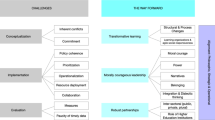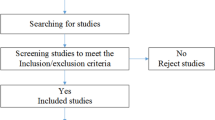Abstract
In order to raise awareness of the ambiguous nature of scientific-technological progress, and of the challenging problems it raises, problems which are not easily addressed by courses in a single discipline and cannot be projected onto disciplinary curricula, Technical University of Darmstadt has established three interdisciplinary study concentrations: “Technology and International Development”, “Environmental Sciences”, and “Sustainable Shaping of Technology and Science”. These three programmes seek to overcome the limitations of strictly disciplinary research and teaching by developing an integrated, problem-oriented approach. For example, one course considers fundamental nuclear dilemmas and uses role-playing techniques to address a controversy in the area of nuclear security. At the same time, incorporating interdisciplinary teaching into a university that is organized around mono- or multi-disciplinary faculties also poses a number of challenges. Recognition in disciplinary curricula, and appropriate organizational support and funding are examples of those challenges. It is expected that science and engineering students, empowered by such interdisciplinary study programmes, will be better prepared to act responsibly with regard to scientific and technological challenges.
Similar content being viewed by others
Notes
More precisely, Husserl has described "lifeworld" as: “The actually intuited, actually experienced and experienceable world, in which practically our whole life takes place” (Husserl 1956, § 9h).
Or as Bryon Newberry has put it: “Technologies, by their very nature, are predisposed to certain types of consequences by the values designed into them.” (Newberry 2006).
However, such courses “not only require the education of the student, but also the re-education of the professor” (Warhaft 2005).
An example might be the deeper understanding of the roots of nuclear proliferation leading to the concept of proliferation resistant shaping of existing (or future) nuclear technology which guides appropriate new technology oriented research. One case is the actual proliferation of research reactors into more than 60 states which can increase proliferation dangers by the availability of weapon-grade uranium inserted in the fuel. Development of high density, low-enriched uranium fuel to replace weapon-grade, highly enriched uranium and the design of a suitable improved reactor core concept providing a similar performance of the research reactor can help to reduce proliferation risks significantly.
But there are exceptions. For example, in 2007 Leuphana University Lüneburg in northern Germany established a compulsory interdisciplinary “Leuphana Semester” for all first semester students. It follows an integrative approach and includes a large module called “Science bears responsibility” (Michelsen 2013).
Furthermore, support is provided for term papers or theses on development issues in several faculties by offering appropriate additional supervisors.
Insight into related traditional disciplinary research fields at TU Darmstadt is also provided.
So far these theses are in environmental law, environmental economics, environmental planning, and environmental pedagogics.
Over the last decades science and technology studies (STS) have been established as separate STS faculties at many US universities but also in some European countries (like in the Netherlands)—mainly as social studies. Sergio Sismondo (2008) has given another interpretation of STS as “Science, Technology, and Society” aiming at an “engaged programme” which is not only describing or interpreting modern science and technology from an academic viewpoint of the humanities but also to tackle the problems of science and technology inside society. The described ISC is tending more to this latter interpretation of STS.
The European Credit Transfer and Accumulation System (ECTS) was introduced in order to facilitate planning, evaluation, recognition and validation of academic qualifications as well as student mobility within the European Higher Education Area created through the so-called Bologna Process. One ECTS credit corresponds to a 30 hours workload. Workload indicates the time students typically need to complete all in-class and out-of-class activities. Sixty ECTS credits are equivalent to the workload of one full time academic year (cf. http://ec.europa.eu/education/lifelong-learning-policy/doc/ects/guide_en.pdf).
For example, disciplines/departments/programmes that have approved the ISCs as minors are architecture, civil engineering, computing science, electrical engineering, material sciences, mechanics, biology, chemistry, physics, economy, pedagogy, political sciences, international studies/peace and conflict research, sociology, and several joint Bachelor of Arts in the humanities.
Cf footnote 11.
As one of five items the relevant passages read: "Qualifications that signify [eligibility for a bachelor's degree] are awarded to students who: have the ability to gather and interpret relevant data (usually within their field of study) to inform judgements that include reflection on relevant social, scientific and ethical issues and “Qualifications that signify [eligibility for a master's degree] are awarded to students who: have the ability to integrate knowledge and handle complexity, and formulate judgements with incomplete or limited information, but that include reflecting on social and ethical responsibilities linked to the application of their knowledge and judgements”. [Cf. the official homepage of the Bologna Process 2007–2010: http://www.ond.vlaanderen.be/hogeronderwijs/bologna/qf/overarching.asp (Accessed 7 October 2013) and http://www.bologna-bergen2005.no/EN/BASIC/050520_Framework_qualifications.pdf (Accessed 7 October 2013)]. The European ministers have committed to elaborating compatible national frameworks by 2010.
Role plays have been used effectively for a long time in teaching efforts to make science and engineering students aware of issues concerning social responsibility, see for example, the works of Wils Cooley and colleagues (1991), Joseph Herkert (1997), Neelke Doorn and Otto Kroesen (2011), and Iris Hunger (2013).
Delegations from Egypt, Germany, France, UK, Iran, Israel, the Netherlands, Russia and the US were to negotiate under the direction of the International Atomic Energy Agency.
References
Boyle, C., & Coates, G. T. K. (2005, Fall). Sustainability principles and practice for engineers. IEEE Technology and Society Magazine, 24(3), 32–39.
Cooley, W., Klinkhachron, P., McConnell, R., & Middleton, N. (1991). Developing professionalism in the electrical engineering classroom. IEEE Transactions on Education, 34(2), 149–154.
Doorn, N., & Kroesen, J. O. (2011). Using and developing role plays in teaching aimed at preparing for social responsibility. Science and Engineering Ethics, 19(4), this issue. doi:10.1007/s11948-011-9335-6.
Feenberg, A. (1999). Questioning technology. London/New York: Routledge.
Frodeman, R. (Ed.). (2010). The Oxford handbook of interdisciplinarity. Oxford: Oxford University Press.
Habermas, J. (1969). Analytische Wissenschaftstheorie und Dialektik (Analytical philosophy of science and dialectic). In T. W. Adorno, R. Dahrendorf, H. Pilot, H. Albert, J. Habermas, & K. R. Popper (Eds.), Der Positivismusstreit in der deutschen Soziologie (The dispute on positivism in German sociology) (pp. 155–191). Darmstadt: Luchterhand.
Habermas, J. (1981). Theorie des kommunikativen Handelns. Frankfurt: Suhrkamp (English trans: The Theory of Communicative Action. Boston: Beacon 1984).
Habermas, J. (1991). Edmund Husserl über Lebenswelt, Philosophie und Wissenschaft (E. Husserl about lifeworld, philosophy and science). In J. Habermas (Ed.), Texte und Kontexte (Texts and contexts) (pp. 34–48). Frankfurt: Suhrkamp.
Herkert, J. (1997). Collaborative learning in engineering ethics. Science and Engineering Ethics, 3, 447–462.
Hunger, I. (2013). Some personal notes on role plays as an excellent teaching tool. Commentary on “Using and developing role plays in teaching aimed at preparing for social responsibility”. Science and Engineering Ethics, 19(4), this issue. doi:10.1007/s11948-013-9477-9.
Husserl, E. (1956). Die Krise der europäischen Wissenschaften und die transzendentale Phänomenologie. In W. Biemel (Ed.), Edmund Husserl-Gesammelte Werke, Band VI (Collected Works, Vol. VI). Den Haag: Martinus Nijhoff. (English trans.: The Crisis of European Sciences and Transcendental Phenomenology. Evanston: Northwestern University Press 1970).
Klein, Julie Thompson. (1990). Interdisciplinarity—history, theory and practice. Detroit: Wayne State University Press.
Liebert, W. (1998). Ambivalenz von Forschung und Technik—Problemlöser oder Problemverursacher der globalen Krise (Ambivalence of science and technology—problem solver or creator of the global crisis). In W. Voigt & J. Scheffran (Eds.), Kampf um die Natur (Fight for nature) (pp. 179–195). Darmstadt: Wissenschaftliche Buchgesellschaft.
Liebert, W. (2002). Wissenschaft jenseits der Wertfreiheitshypothese—Ambivalenz und Wertfreiheit versus Wertbindung und Gestaltung der Wissenschaft (Beyond the hypothesis of value-free science—ambivalence and value-free science versus value-laden science and shaping of science). In H.-J. Fischbeck & J. Schmidt (Eds.), Wertorientierte Wissenschaft—Perspektiven für eine Erneuerung der Aufklärung (Value-oriented science—perspectives for a renewal of the enlightenment) (pp. 61–83). Berlin: Sigma.
Liebert, W. (2012). Wissenschaft und gesellschaftliche Verantwortung (Science and societal responsibility). In U. Banscherus, K. Himpele, & A. Keller (Eds.), Gut–besser–excellent? Qualität von Forschung, Lehre und Studium entwickeln (Good–better–excellent? Quality of research, teaching and studies) (pp. 97–107). Bielefeld: W. Bertelsmann.
Liebert, W., & Schmidt, J. C. (2010). Towards a prospective technology assessment—challenges and requirements for technology assessment in the age of technoscience. Poesis and Praxis, 7, 99–116.
Manion, M. (2002, Fall). Ethics, engineering, and sustainable development. IEEE Technology and Society Magazine, 21(3), 39–48.
Michelsen, G. (2013). Sustainable development as a challenge for undergraduate students: The module “Science bears responsibility” in the Leuphana bachelor’s programme. Commentary on “A case study of teaching social responsibility to doctoral students in the climate sciences”. Science and Engineering Ethics, 19(4), this issue. doi:10.1007/s11948-013-9489-5.
Mittelstraß, J. (1982). Wissenschaft als Lebensform (Science as lifeform). Frankfurt: Suhrkamp.
Mittelstraß, J. (1996). The modern world and the humanities. Interdisciplinary Science Reviews, 21(4), 284–291.
Newberry, B. (2006, Winter). The fate of human technological civilization. IEEE Technology and Society Magazine, 25(4), 28–29.
Sismondo, S. (2008). Science and technology studies and an engaged program. In E. Hackett, O. Amsterdamska, M. Lynch, & J. Wajcman (Eds.), The handbook of science and technology studies (3rd ed., pp. 13–31). Cambridge MA, London: MIT Press.
Warhaft, Z. (2005, Summer). Teaching engineering in a social context. IEEE Technology and Society Magazine, 24(2), 32–39.
Zandvoort. H. (Ed.) (2008). Preparing engineers for social responsibility. European Journal of Engineering Education, 33(2), Part 1, 133–195.
Zandvoort, H., Børsen, T., Deneke, M. & Bird, S. J. (2013) Editors’ overview: Perspectives on teaching social responsibility to students in science and engineering. Science and Engineering Ethics, 19(4), this issue.
Acknowledgments
Input from colleagues at TU Darmstadt (where the author worked full-time until the end of 2012) in particular from Franz Fujara and Oliver Lieven, Liselotte Schebek, and Jochen Hack as well as fruitful discussions with the guest editors and the editor are gratefully acknowledged.
Author information
Authors and Affiliations
Corresponding author
Rights and permissions
About this article
Cite this article
Liebert, W.J. Preparing to Understand and Use Science in the Real World: Interdisciplinary Study Concentrations at the Technical University of Darmstadt. Sci Eng Ethics 19, 1533–1550 (2013). https://doi.org/10.1007/s11948-013-9488-6
Received:
Accepted:
Published:
Issue Date:
DOI: https://doi.org/10.1007/s11948-013-9488-6




